Dr. James Craven remembers back in his residency days when he and other doctors-in-training would use all the tools they had available to diagnose patients with the most complex medical conditions and then watch as those patients were seen by a highly respected veteran physician.
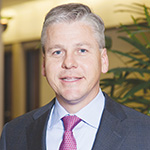
"He'd just ask the simplest of questions: Where are you from? Who were your parents? What kind of work did you do? And like clockwork, he'd hit the diagnosis," recalls Craven, a vascular surgeon who is president of Franciscan Health Physicians. The physicians group is part of Baton Rouge, Louisiana-based Franciscan Missionaries of Our Lady Health System.
Craven says the uncanny diagnostic skills of the doctor who helped train him made him realize that if care providers take time to question patients and listen intently to their responses "they'll tell us exactly what's wrong with them."
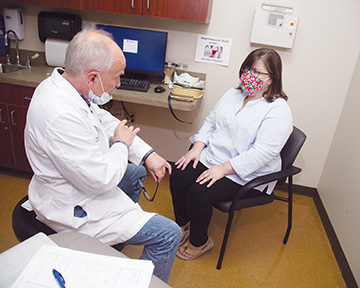
That conviction is among the reasons Craven says he is an avid supporter of the "We Listen. We Heal." initiative that FMOLHS has rolled out in recent months to encourage active listening between leaders and staff and between staff and patients.
"For me, it's about putting the patient at the center of the medical enterprise and focusing on their experience," Craven says. "There's nothing more sacred than that physician-patient relationship, and the cornerstones are compassion and empathy."
Internal, external goals
Hunter Richardson, FMOLHS's chief human resources officer, says the system's leaders hope the initiative will improve communication with — and foster greater empathy for — patients, leading to better care
outcomes, higher patient retention and goodwill that attracts new patients. They also hope it will build employee engagement and counter burnout.
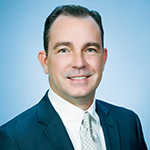
"We know that if team members feel valued and listened to and heard that they are more likely to replicate that behavior with our patients," Richardson says.
Nicole Terry is a former communications director at Our Lady of the Lake Regional Medical Center in Baton Rouge, the system's largest hospital. She is now in a similar role with Revive, a consulting firm that helped develop "We Listen. We Heal."
Terry says several factors propelled the initiative. Among them are the stresses on health care workers and the strained relationships with some patients caused by the COVID-19 pandemic and protocols; staffing shortages and burnout; the advance of telemedicine; and the push by retailers, technology companies and private equity firms "to insert themselves into the health care space."
Terry points to studies that show how listening impacts patient care. One she references was published in the Journal of General Internal Medicine in July 2018. It found that clinicians seldom listen to what patients have to say and, when they do, often quickly interrupt. The study concludes: "Failure to elicit the patient's agenda reduces the chance that clinicians will orient the priorities of a clinical encounter toward specific aspects that matter to each patient."
To find out what people who live within the system's service area want from their health care providers, FMOLHS conducted surveys and held listening sessions last summer. "Overwhelmingly what was interesting is that patients said they just want to feel heard," Terry says. "They want to feel understood and a part of their health care process."
The survey findings prompted FMOLHS executives to make an organizational commitment to active listening, that is, making a conscious effort to hear, understand and retain what's being shared.
Staff buy-in
In the run-up to the launch of "We Listen. We Heal.", Richardson says FMOLHS shifted its leadership development focus to active listening and how to connect with staff. Leaders are expected to give their team members
at least weekly opportunities to be heard by rounding with them, holding group discussions or having one-on-one conversations.
"It's not necessarily new for everybody," Richardson says. "Some of our leaders were already doing this, but it formalized the expectation we have for our leaders."
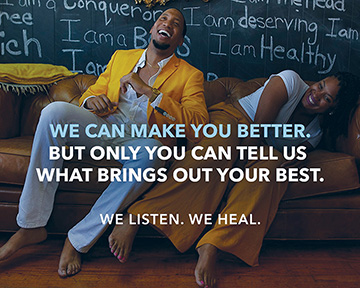
The wider internal initiative kicked off in January with listening sessions, training opportunities and resources on active listening techniques made available for staff across the system, which has about 11,000 full-time employees at facilities in Louisiana and Mississippi. At an event just for physicians, the system brought in as a speaker Dr. Abraham Verghese, a renowned professor at the Stanford University Medical School who advocates for patient-centered care.
Before FMOLHS began promoting the initiative to the public early this year, the system previewed for staff all of the promotional materials including social media postings, billboards and TV spots for "We Listen. We Heal."
Craven says he believes that the initiative's internal launch achieved its goal of getting buy-in from staff. He jots down some of the comments he hears from other clinicians on sticky notes as reminders of the campaign's impact. Those comments include: "What an honor to be part of this organization." And, "I truly love my job."
Says Craven: "I think it's just been a rough two years, and this was an opportunity to refocus on why we chose this profession."
Mission connection
Richardson says engagement surveys have shown that staff feel a strong connection with FMOLHS's faith-based mission. He adds many workers are excited by how "We Listen. We Heal." promotes that mission.
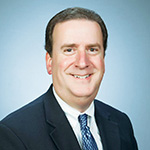
Peter Guarisco Jr., FMOLHS's senior vice president of mission integration, is part of the system's Mission, People, Culture Committee that is guiding the initiative. He says active listening ties in seamlessly with the system's mission to escort patients on their paths to wellness.
"It's an organic connection to our mission and our ministry, because without listening, we are not able to form relationships, so we're not able to accompany others," Guarisco says.
He points out that in the Gospel, whenever someone came for healing, Jesus would ask: "What do you want me to do for you?"
"So, he allowed them to be part of their healing and the way he did that was by asking the questions and allowing them to be part of the conversation," Guarisco says.
FMOLHS, he says, is adopting that same approach to healing through "We Listen. We Heal." "Listening, to us, is a way in which we bring about our humanity and our connectedness," he says.
'Caring for our own'
In addition to ads and postings that spotlight FMOLHS's focus on listening, the public-facing "We Listen. We Heal." campaign includes a webpage with resources
related to the initiative, such as tips on how to prepare for a medical appointment; profiles of care providers; and a link to a channel on the streaming service Spotify with a playlist in harmony with the initiative's theme.
Terry says feedback from the public on "We Listen. We Heal." has been positive; FMOLHS is still figuring out what metrics to use to measure its impact.
As the patient-facing work advances, the staff outreach that is part of the initiative is ongoing. System leaders are hosting forums at care sites on topics that change each quarter. The current focus is on what recognition and rewards staffers find motivating.
Says Craven: "The pandemic has strained our workforce like nothing (else) and to maintain that strong culture within Franciscan Missionaries, I think we not only need to care for our patients, but at this time, given the challenges we face, we need to
make sure we're caring for our own team members."
